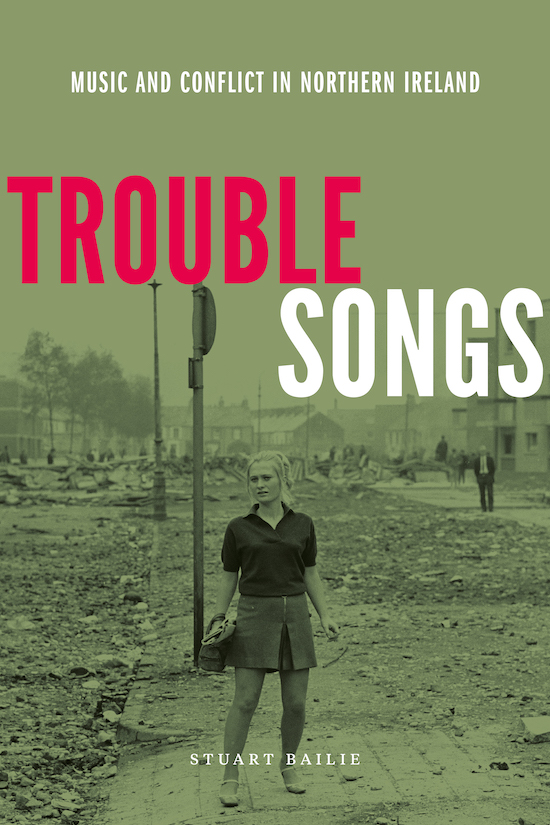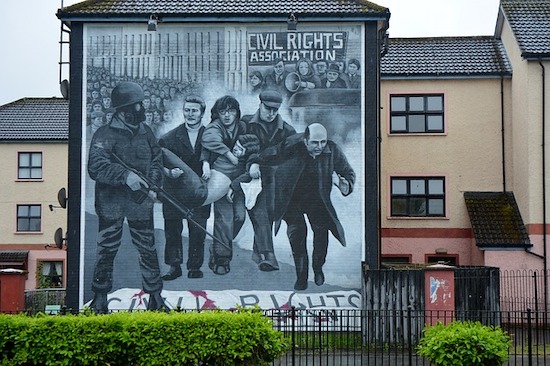Stuart Bailie, a former reviews editor at NME, has written a very timely and pertinent book on Northern Irish music. It comes as a hard Brexit looms, threatening to disrupt over twenty years of peace, and as more readers learn about the horrors of the Troubles from the recent Booker Prize winning novel, Milkman by Anna Burns. Trouble Songs – Music and Conflict in Northern Ireland joins the dots between music, culture, radical politics, and a thirty year conflict that killed over 3,600 people.
Bailie writes with tremendous skill and authority. Chapters on The Clash pulling a show in the Ulster Hall at the eleventh hour, Elvis Costello writing Oliver’s Army after a trip to Belfast, and Banamarama attending the funeral of a friend killed by a British soldier, all shed fascinating light on pop culture’s commentary of the Troubles. While examining ‘Alternative Ulster’ by Stiff Little Fingers, an anthem that lit the fuse for punk’s resistance to violence and sectarianism, Bailie notes: "Jake Burns sang the lyrics in a hurry, like a guy in a phone box running out of change. The air comes out of his oesophagus with a wretching sound. This was acceptable in the punk era, when vocalists like Johnny Rotten and Joe Strummer sounded alien, deranged, unwell."
Bailie has also written a biography of Phil Lynott and Thin Lizzy (one of the greatest Irish bands of all time alongside My Bloody Valentine). "Music is the only thing I really know about," he asserts. "I think a lot of music journalists are on a spectrum to one degree or another. We relate to the world primarily through songs and lyrics. I’m obsessed with the songs and the artists that I cover in the book."
Stuart was anxious not to indulge in what one local describes as ‘Troubles porn’. "A lot of books about the Troubles are very dry," he says. "They’re written by news journalists, whereas I grew up reading Tom Wolfe and England’s Dreaming by Jon Savage." In addition to nailing the North of Ireland’s unique soundtrack, Troubles Songs catalogues how everything went so horribly and tragically wrong. On July 31, 1975, music itself became a target when three members of the hugely popular Miami Showband were murdered. "People became savage," Bailie laments. "There was something completely psychopathic in the way that the Miami Showband were killed. They shot the trumpet player in the scrotum, which is not a typical military or paramilitary style execution. There is something incredibly grotesque and macabre about it all, but it’s how some people got their kicks. There were always kind people on the sidelines trying to do their best, but the beasts got out."
Sport also became somewhat soured by sectarianism, leaving music as the only vibrant youth culture to bring people together from different communities. "Terri Hooley set up a shop in Belfast putting DIY singles and instilling the feeling that you could create your own destiny," Bailie says. "I was in some awful punk bands. Some of them ended up making terribly contrived records for A&R men, but I loved talking to journalists and getting stuck into media campaigns. I grew out of being a bad songwriter and performer and developed an other itch."

Bailie escaped from Belfast during the Troubles to pursue a career as a music journalist. "In the Spring of 1985, I sold all my instruments and went to London with a typewriter under my arm," he says. "I got a job at Record Mirror, which was kind of midway between Smash Hits and NME for indie kids who didn’t want to read long features, but they were lovely people. Then, I went to Warner’s press department, where worked on campaigns for Ted Nugent, Robert Plant, The Soup Dragons and James. It was all very 80s with people wearing power suits and working eighteen hour days. I thought it was horrible, but I got to know a lot of NME writers, so, in 1988, I ended up there."
Stuart’s NME years coincide with some of the most exciting in its history. "Alan Lewis was the editor, and James Brown joined, so you had Barbara Ellen, Stuart Maconie, Andrew Collins, Swells, Mary Anne Hobbs and Steve Lamacq," he recalls. "I’ve never been in a more exciting place before, or since. NME became a holding area for very eccentric and dysfunctional types. It was like being in a wonderful sitcom of really fucked up human beings. The marketing people never came near us. There might be pages and pages of ads for a Morrissey album campaign, but the reviewer would have no qualms in saying the record was complete shit, which is not allowed anymore in today’s corporate world. NME had a great culture of disrespect, indulgence, politics, drugs and misbehaviour. There was no better place to be in your 20s."
Stuart enjoyed eleven eventful years in London before moving back to Northern Ireland. "I felt I’d done all that I wanted to do and I’d just started a young family," he says. "There was such a rich streak of creativity coming out of Belfast with Ash, The Divine Comedy, and David Holmes, and the peace process was working out, so I wanted to be there." Bailie established the Oh Yeah Centre in Belfast’s Cathedral Quarter, transforming a derelict warehouse into an arts centre, venue and recording studio, and co-presented Across The Line on BBC Radio Ulster. Troubles Songs is his triumphant return to writing. In a music publishing industry that to date has been preoccupied with tacky tomes about U2, it is one of the most important books about Irish music ever written.

With Northern Ireland in another state of uncertain flux, Bailie notes a fresh burst of creativity coming out of Derry, the hometown and birthplace of The Undertones, and the sorely underrated That Petrol Emotion (who were banned from the BBC because of a reference in their sleeve artwork to the then Sinn Féin leader Gerry Adams).
"Derry is holding the line with some great new artists," Bailie maintains. "Wood Burning Savages are angry, articulate, and very aware. Susie Blue is a very militant lesbian artist. Derry was so important long before punk came along. What Eamonn MCann (socialist activist who started the civil rights movement in Northern Ireland) did back in 1968 was so important in demanding rights and and an end to sectarianism. Now, bands like Touts are inspired by Eamonn McCann. Derry is one of the most abused cities in the western world, and arguably where the conflict started, but Derry excites me, whereas I think Belfast has thrown itself head first into neo-liberalism. In the last ten years, Belfast has whored itself out, which really depresses me. The Cathedral Quarter used to be anarchic and colourful and full of people trying to really change the fabric of the place, but now, it is all about theme pubs and stag and hen weekends."
As Joe Strummer used to say, the future is unwritten, but for the region, there could be trouble ahead. Northern Ireland doesn’t have a functioning government; Brexit and a hard border could unleash absolute chaos; the repugnant Democratic Unionist Party (DUP) are in a shoddy coalition deal with Theresa May; and its citizens are still denied rights. "Northern Ireland is the only place in our islands where you don’t have marriage equality and religious fundamentalists have a ridiculous amount of power," Bailie mourns. "I’m 57 now, so I can’t really remember anything before the Troubles, as I was about 7 when it started, but I remember how bands like Stiff Little Fingers and The Undertones digged in and got on with it, and how Terri Hooley was always so bloody minded and defiant. What David Holmes did at Sugar Sweet was very consistent with that: let’s be really contrary, stubborn and exciting. I don’t want Northern Ireland to lose that. More people have died by suicide since 1998 than died in the Troubles, which is just horrendous. This is partly a legacy of the conflict, and partly because of the neo-liberal shit that is everywhere. There is no care or consideration for trauma and working class people. When is the next revolution? I want to be there."
Trouble Songs is available from Music Glue. Stuart Bailie will be appearing at this year’s Louder than Words festival in Manchester, November 9-10, , the Sunflower Bar, Belfast, on November 14, and Eblana Senior College, Dún Laoghaire, Co. Dublin, on November 18


